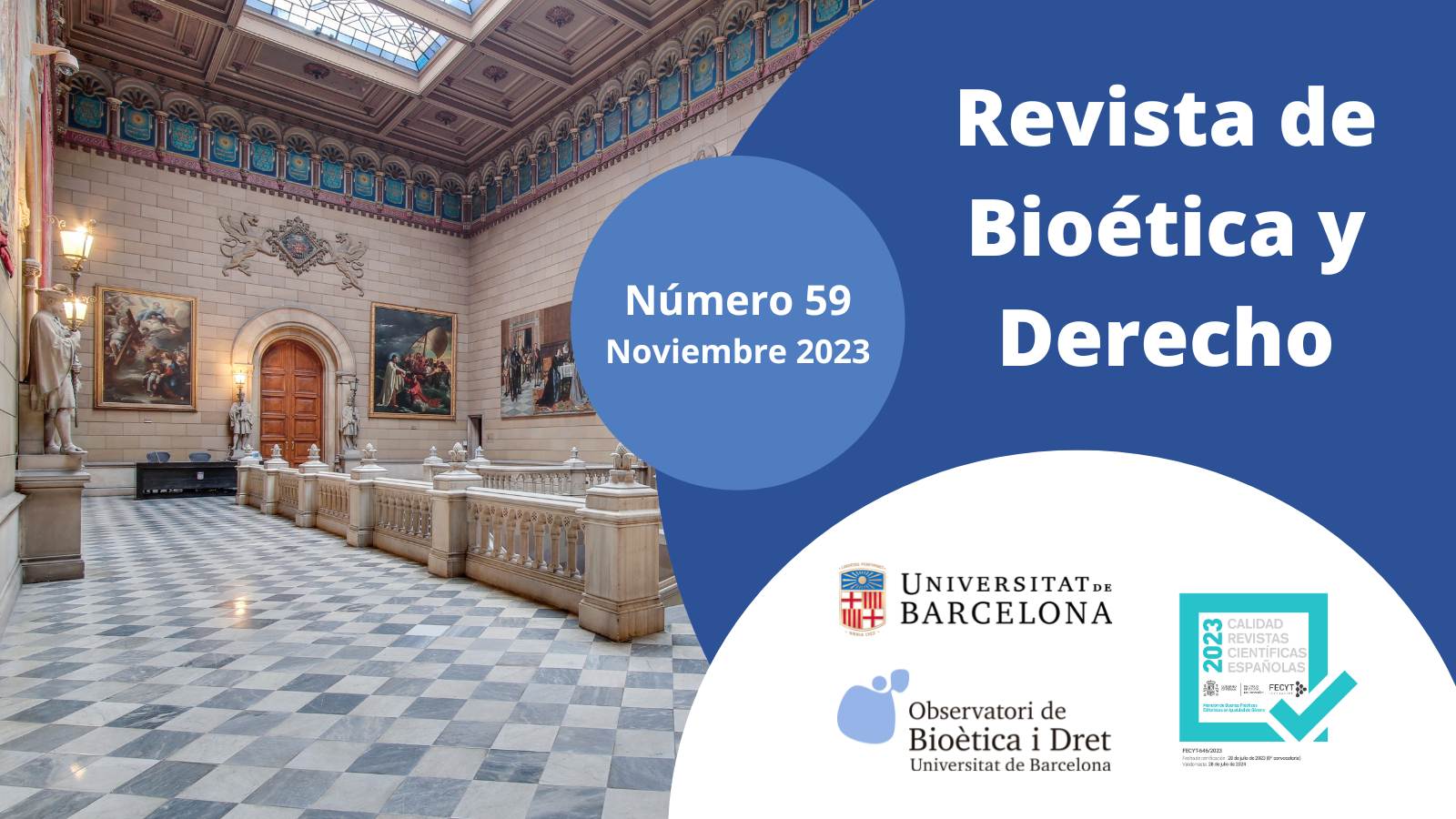Voluntary Active Euthanasia, Assisted Suicide, Orthothanasia and Palliative Care: an overview of the discussions in the Brazilian Federal Legislative Power
DOI:
https://doi.org/10.1344/rbd2023.59.39640Keywords:
euthanasia, assisted suicide, voluntary active euthanasia, palliative care, legislationAbstract
Within the scope of Brazilian legislative proposals, we sought to understand the challenges and obstacles in the delimiting path of end-of-life practices. 193 documents were analyzed, from 1981 to 2020, based on the hermeneutic-dialectical methodology. Different regulatory proposals for the practices of euthanasia and orthothanasia, in relation to palliative care, were evidenced. The associations of the terms “palliative care” and “orthothanasia”, as opposed to “euthanasia/assisted suicide, revealed the conflicting construction of values that permeates our society. With the processing of projects related to orthothanasia and euthanasia, we understand the meaning of political decisions that involve the possibilities of choices and freedom of people, between the right to life and the right to a dignified death. We understand the problem of legalizing orthothanasia as a way for the legislative power to evade the debate on euthanasia/assisted suicide, as an alternative to dysthanasia and suffering in the dying process.
References
(1) Silva CO da, Crippa A, Bonhemberger M. Diretivas antecipadas de vontade: busca pela autonomia do paciente. Rev Bioética. 2021;29(4):2021.
(2) Siqueira-Batista R, Schramm FR. Conversações sobre a “boa morte”: o debate bioético acerca da eutanásia. Cad Saúde Pública. 2005;21(1):111–9.
(3) Pozzada JP, Santos MA dos, Santos DB. Sentidos produzidos por psicólogos que trabalham com cuidados paliativos no Sistema Único de Saúde (SUS) sobre o cuidar em cenários de morte e morrer. Interface (Botucatu). 2022;26:1–15.
(4) Pacheco LB, Mendes PR. Perguntas e respostas sobre Regimento interno da Câmara dos Deputados [recurso eletrônico]. 5th ed. Brasília: Edições Câmara; 2018.
(5) Brasil. Câmara dos Deputados. [Constituição (1988)]. Constituição Federal de 1988 atualizada até a Emenda Constitucional no 107/2020. Brasília: Edições Câmara; 2020.
(6) Colômbia. Ministerio de salud y Protección Social. Resolución número 00001216 de 2015 [Internet]. Bogota; 2015 [citado 12 Nov 2021]. Disponível em: https://www.minsalud.gov.co/Normatividad_Nuevo/Resolución 1216 de 2015.pdf.
(7) Gianello MC, Winck DR. A eutanásia e sua legalização no Brasil e no mundo. Vol. 2, Anuário Pesquisa e Extensão Unoesc. Videira: ACH Artigos; 2017. p. 1–15.
(8) Barchifontaine C de P de. A dignidade no processo de morrer. In: Pessini L, Barchifontaine C de P de, editors. Bioética: alguns desafios. São Paulo: Edições Loyola; 2001. p. 283–96.
(9) Brasil. Câmara dos Deputados. [Código penal (1940)]. Código penal e de processo penal. Prates MMB, organizadora. Brasília: Edições Câmara; 2020.
(10) Eich M, Verdi MIM, Finkler M, Martins PPS. Princípios e valores implicados na prática da sedação paliativa e a eutanásia. Interface (Botucatu). 2018;22(66):733–44.
(11) Castro MPR de, Antunes GC, Marcon LMP, Andrade LS, Rückl S, Andrade VLÂ. Eutanásia e suicídio assistido em países ocidentais: revisão sistemática. Rev Bioética. 2016;24(2):355–67.
(12) Holanda. Government of the Netherlands. Euthanasia, assisted suicide and non-resuscitation on request [Internet]. 2017 [citado 02 Nov 2021]. Disponível em: https://www.government.nl/topics/euthanasia/contents/euthanasia-assisted-suicide- and-non-resuscitation-on-request.
(13) Minayo MC de S. O Desafio do Conhecimento: Pesquisa Qualitativa em Saúde. 12th ed. São Paulo: Hucitec; 2014.
(14) Minayo MC de S. Hermenêutica-Dialética como Caminho do Pensamento Social. In: Minayo MC de S, Deslandes SF, organizadoras. Caminhos do pensamento: epistemologia e método. Rio de Janeiro: Editora Fiocruz; 2013. p. 83–108.
(15) Berlinguer G. Bioetica Quotidiana. Firenze, Italia: Giunti Editore; 2010.
(16) Pose C. Bioética de la responsabilidad: de Diego Gracia a Xavier Zubiri. Madrid, España: Triacastela; 2011.
(17) Gracia D. Pensar a bioética: metas e desafios. São Paulo-SP: Centro Universitário São Camilo; Loyola; 2010.
(18) Sanches KMS y, Seidl EMF. Ortotanásia: uma decisão frente à terminalidade. Interface - Comunic, Saúde, Educ. 2013;17(44):23–34.
(19) CFM. Conselho Federal de Medicina. Resolução CFM no 1.805/2006 [Internet]. Brasília; 2006 [citado 20 Nov 2021]. Disponível em: http://www.portalmedico.org.br/resolucoes/CFM/2006/1805_2006.htm.
(20) CFM. Conselho Federal de Medicina. Justiça valida Resolução 1805, que trata sobre ortotanásia [Internet]. Brasília; 2010 [citado 20 Nov 2021]. Disponível em: https://portal.cfm.org.br/index.php?option=com_content&view=article&id=21154:justic a-valida-resolucao-1805-que-trata-sobre-ortotanasia&catid=3.
(21) CFM. Conselho Federal de Medicina. Os limites da vida e as limitações da Justiça do Brasil [Internet]. Brasília; 2014 [citado 20 Nov 2021]. Disponível em: https://portal.cfm.org.br/index.php?option=com_content&view=article&id=24947:os- limites-da-vida-e-as-limitacoes-da-justica-do-brasil&catid=46:artigos&Itemid=18.
(22) Alonso JP. Contornos negociados del “buen morir”: la toma de decisiones médicas en el final de la vida. Interface - Comunic, Saude, Educ. 2012;16(40):191–203.
(23) Martin LM. Eutanásia e distanásia. In: Costa SIF, Oselka G, Garrafa V, organizadores. Iniciação à bioética. Brasília: Conselho Federal de Medicina; 1998. p. 171–93.
(24) Lima RGS, Verdi M. Giovanni Berlinguer: uma história de luta pela consolidação do direito à saúde. In: Hellmann F, Verdi M, Gabrielli R, Caponi S, organizadores. Bioética e Saúde Coletiva: perspectivas e desafios contemporâneos. Florianópolis: DIOESC; 2012. p. 18–35.
(25) Gracia D, Feito L, Moratalla TD, González MÁS, Martínez JA. Ética y ciudadanía: construyendo la ética. Gracia D, editor. Madrid, Espanha: PPC, Editorial y Distribuidora, SA; 2016.
Downloads
Published
How to Cite
Issue
Section
License
Copyright (c) 2023 Melisse Eich, Marta Verdi, Mirelle Finkler, Pedro Paulo Scremin Martins

This work is licensed under a Creative Commons Attribution-NonCommercial-NoDerivatives 4.0 International License.
 The author retains the copyright and grants Revista de Bioética y Derecho the right of first publication of the article. All articles published in Revista de Bioética y Derecho are under Creative Commons licensing Recognition – Non Commercial – NoDerivedArtwork (by-nc-nd 4.0), which allows sharing the content with third parties, provided that they acknowledge its authorship, initial publication in this journal and the terms of the license. No commercial use of the original work or generation of derivative works is permitted.
The author retains the copyright and grants Revista de Bioética y Derecho the right of first publication of the article. All articles published in Revista de Bioética y Derecho are under Creative Commons licensing Recognition – Non Commercial – NoDerivedArtwork (by-nc-nd 4.0), which allows sharing the content with third parties, provided that they acknowledge its authorship, initial publication in this journal and the terms of the license. No commercial use of the original work or generation of derivative works is permitted.







